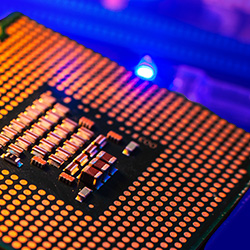Defects in Semiconductors 2024
 Current technology heavily relies on our ability to detect, control, and understand defects in semiconductors. Whether beneficial or detrimental, defects play crucial roles in various semiconductor materials. Advances in synthesis, thin-film growth, microscopy, spectroscopy, and theory have led to new insights into how defects behave in these materials, improving performance in applications such as silicon chips, photovoltaics, light-emitting diodes, laser diodes, and quantum information. This Special Topic on Defects in Semiconductors provides a valuable forum where researchers can share their latest and most innovative findings related to the fundamentals of defects in semiconductors.
Current technology heavily relies on our ability to detect, control, and understand defects in semiconductors. Whether beneficial or detrimental, defects play crucial roles in various semiconductor materials. Advances in synthesis, thin-film growth, microscopy, spectroscopy, and theory have led to new insights into how defects behave in these materials, improving performance in applications such as silicon chips, photovoltaics, light-emitting diodes, laser diodes, and quantum information. This Special Topic on Defects in Semiconductors provides a valuable forum where researchers can share their latest and most innovative findings related to the fundamentals of defects in semiconductors.
Topics covered include, but are not limited to:
- Silicon, Germanium, Silicon Carbide, and Diamond
- Nitrides and other III-V materials
- Oxides and other chalcogenide semiconductors
- Organic semiconductors and perovskites
- 2D semiconductor materials
- Low-dimensional semiconductor structures
- Defects for quantum information
- Defect-induced electrical, magnetic, thermal, and optical properties
- Theory, computational methods, and experimental methods for characterization and understanding of defects
Guest Editors
Anderson Janotti, University of Delaware
John L. Lyons, US Naval Research Laboratory
Darshana Wickramaratne, US Naval Research Laboratory
Cyrus Dreyer, Stony Brook University
Submission and acceptance criteria:
Manuscripts considered for publication in Journal of Applied Physics are expected to meet the journal’s standard of acceptance: to report on original and timely results that significantly advance understanding in contemporary applied physics. Material that is exclusively review in nature is not considered for publication. Manuscripts submitted for consideration in this Special Topic must meet the same criteria and will undergo the journal’s standard peer-review process. The Editorial Team of Journal of Applied Physics will issue final decisions on the submitted manuscripts. Manuscripts will publish immediately upon acceptance.
For more information on the journal’s editorial policies, please click here.
Manuscripts must be submitted through the online submission system (PXP) of Journal of Applied Physics. Please select the Special Topic “Defects in Semiconductors 2024” to submit your manuscript for consideration in this Special Topic.
